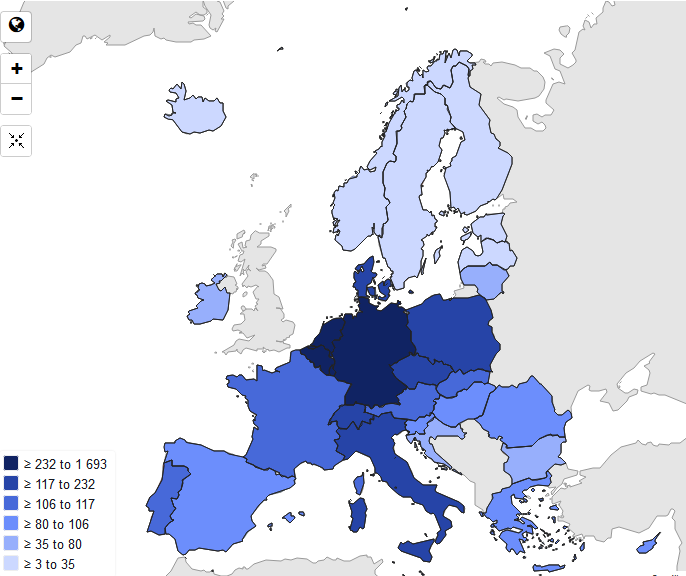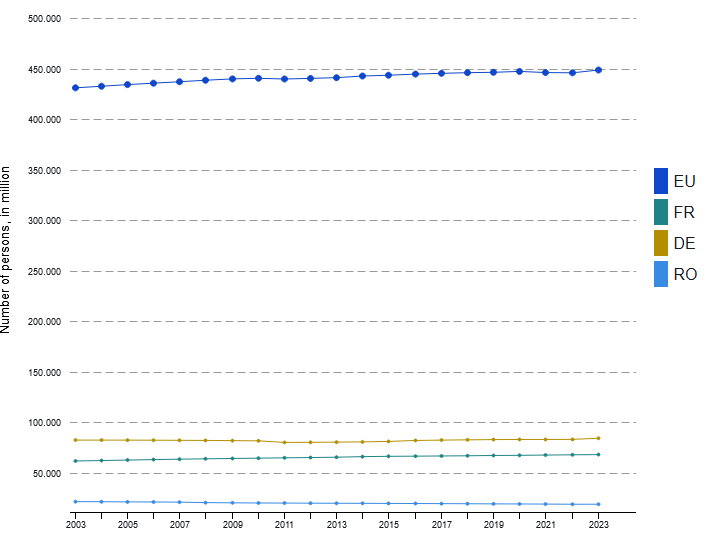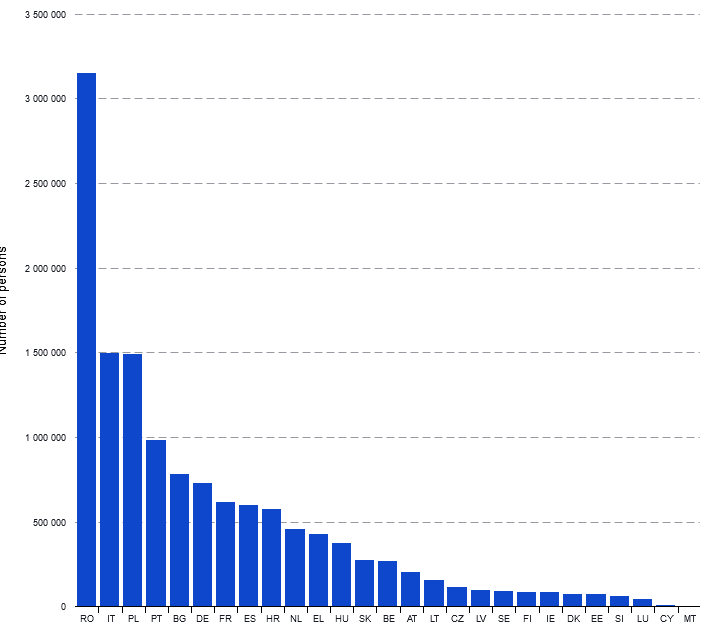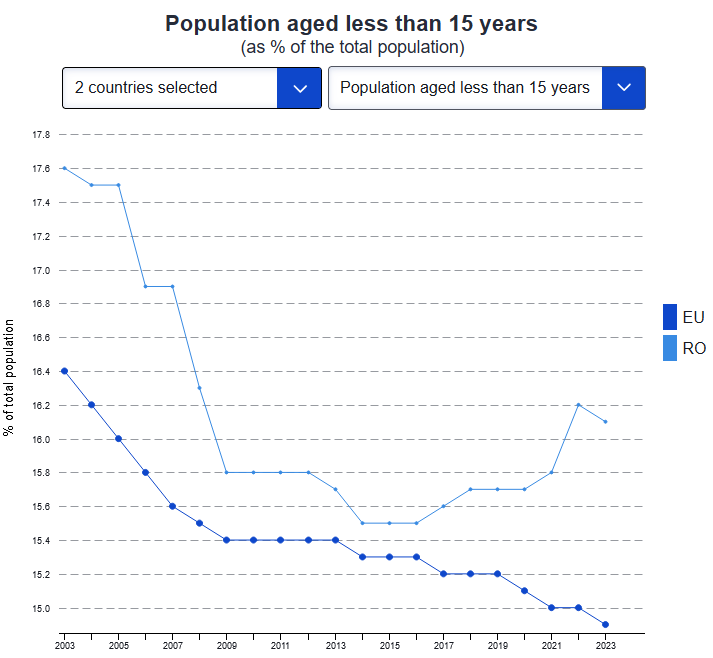This is a tour guide if you want to travel to Romania – a cheap place where you can find exquisite food (I mean it!).
TOC
Statistics about Romania
Overview of the Romanian Language
Romanian Alphabet & Pronunciation
Vowels
Consonants
Useful words
English-like words
Traveling to Romania
Safety
Be aware of scams
Accommodation
Locomotion
Statistics
I left Romania, country where I was born, more than 20 years ago. I decided to take a look on how it evolved since I left and I am happy to see that things are progressing quite well.
Romania is very less populated, with a population density way under the EU average.


The birth rate is high but the immigration is also high.

Romanians are rejuvenating the aging population of EU:

Source: www.ec.europa.eu/eurostat
![]()
Overview of the Romanian Language
Romanian (Română) is a Romance language, part of the same language family as Italian, French, Spanish, and Portuguese. It is the official language of Romania and Moldova and has around 24–26 million native speakers. What makes Romanian unique is its preservation of Latin structures while being heavily influenced by surrounding Slavic, Hungarian, Turkish, and Greek languages due to its geographical location and historical development.
Romanian Alphabet & Pronunciation
Romanian uses the Latin alphabet, with 31 letters. It shares many similarities with English and other Romance languages, but also includes special characters that are unique to Romanian.
Romanian alphabet is almost pure-phonetic! Exceptions are these groups of letters: ce/ci, ge/gi, che/chi, ghe/ghi.
Here is the Romanian alphabet:
- A, a – Same as in English
- Ă, ă – Pronounced like the ‘a’ in sofa or butter (schwa sound /ə/) but more powerful.
- Â, â and Î, î – Both pronounced as a closed /ɨ/ sound, like a mix between “i” and “u,” with no exact English equivalent. This sound is central to Romanian. Here is a video.
- B, b – Same as in English.
- C, c – When followed by ‘e’ or ‘i,’ it sounds like the ‘ch’ in cheese. Otherwise, it’s like the ‘k’ in cat.
- D, d – Same as in English.
- E, e – Like the ‘e’ in bet.
- F, f – Same as in English.
- G, g – Like ‘g’ in go, but when followed by ‘e’ or ‘i,’ it’s soft, like ‘g’ in gentle.
- H, h – Pronounced like ‘h’ in house, but it’s silent in some words of Latin origin (e.g., hora).
- I, i – Like ‘ee’ in see. At the end of a word, it’s pronounced softly, almost like the ‘y’ in happy.
- J, j – Like the ‘s’ in measure.
- K, k – Only a few words use this letter (Kg, Km)
- L, l – Same as in English.
- M, m – Same as in English.
- N, n – Same as in English.
- O, o – Like the ‘o’ in more.
- P, p – Same as in English.
- Q, q – Very rare, mostly used in borrowed words.
- R, r – Rolled/trilled ‘r,’ similar to Italian or Spanish.
- S, s – Same as in English.
- Ș, ș – Like the ‘sh’ in ship, shell
- T, t – Same as in English.
- Ț, ț – Like the ‘ts’ in cats.
- U, u – Like the ‘oo’ in food.
- V, v – Same as in English.
- W, w – Rare, found in loanwords.
- X, x – Pronounced as in English, either /ks/ or /gz/.
- Y, y – Only a few words use this letter, appears in foreign words and technical terms.
- Z, z – Like the ‘z’ in zebra.
Pronunciation Compared to English and Other Romance Languages
Romanian phonetics have distinct characteristics that set it apart from other Romance languages. While English has a complex system of vowel and consonant pronunciation, Romanian has a more phonetic orthography, meaning words are typically pronounced as they are spelled. Here’s how it compares:
-
Vowels:
- Romanian vowels are generally more stable than in English. For instance, the letter ‘A’ is consistently an open vowel (like in Spanish), whereas English has variations like in cat or father.
- Romanian also has the schwa (ă), as well as two distinct centralized vowels (î/â), which have no equivalent in most Romance languages or English.
-
Consonants:
- C and G follow similar rules as in Italian, with ‘soft’ sounds before ‘e’ and ‘i’, and hard sounds otherwise.
- The trilled R is typical of Romance languages, unlike the more relaxed English “r.”
- Unique to Romanian are the sounds Ș (sh) and Ț (ts), which are more common in Slavic languages.
-
Stress:
- Romanian, like Italian and Spanish, tends to place stress on the penultimate (second-to-last) syllable of words, but there are exceptions. This can differ significantly from English stress patterns, which are more irregular.
Comparisons with Related Romance Languages
Although Romanian shares vocabulary and grammar with other Romance languages, it’s notably more conservative in some areas:
-
Latin Roots: Romanian retains many elements from Vulgar Latin that have disappeared from other Romance languages. For instance, the declension of nouns into cases (nominative, accusative, genitive, dative) is more prevalent in Romanian than in languages like Spanish or Italian.
-
Slavic Influence: Due to its geographical location, Romanian has borrowed extensively from neighboring Slavic languages, especially in terms of vocabulary and pronunciation. For example, the ‘ă’ sound, although similar to the schwa in English, is more commonly associated with Slavic tongues.
-
Grammatical Gender: Romanian has three grammatical genders: masculine, feminine, and neuter. Neuter nouns behave like masculine nouns in the singular and feminine in the plural, which is unique among Romance languages. By contrast, English has lost grammatical gender almost entirely, and other Romance languages, like Spanish or French, have only masculine and feminine forms.
-
Definite Articles: One of the most distinguishing features of Romanian compared to other Romance languages is the placement of the definite article at the end of the noun (a feature shared with Bulgarian and Albanian). For instance:
- Romanian: băiat (boy) → băiatul (the boy)
- English and other Romance languages place the article before the noun (e.g., el niño in Spanish or le garçon in French).
Basic Vocabulary and Phrases
Many Romanian words share Latin origins with other Romance languages, which makes some vocabulary recognizable to English speakers as well. However, Romanian also features many words of Slavic, Greek, Turkish, and Hungarian origin.
Loanwords and Unique Vocabulary
Romanian’s vocabulary is distinctively a mix of its Latin heritage and Slavic influence. Words like multumesc (thank you) reflect this dual heritage, being derived from Slavic rather than Latin (compare to grazie in Italian or gracias in Spanish). There are also borrowings from Turkish (like ciorbă – a type of soup) and Hungarian.
Comparison Table of Common Phrases
| English | Romanian | Spanish | Italian | French |
|---|---|---|---|---|
| Hello | Bună/Salut | Hola | Ciao | Bonjour |
| Goodbye | La revedere / Pa | Adiós | Arrivederci | Au revoir |
| Thank you | Mulțumesc / Mersi | Gracias | Grazie | Merci |
| Yes | Da | Sí | Sì | Oui |
| No | Nu | No | No | Non |
| Please | Vă rog | Por favor | Per favore | S’il vous plaît |
| How are you? | Ce mai faci? | ¿Cómo estás? | Come stai? | Comment ça va? |
Romanian, while distinctly Latin in origin, carries influences from its neighbors and maintains its own unique phonology, making it both familiar and foreign to speakers of other Romance languages. Its consistency in spelling and pronunciation is advantageous for language learners, though some sounds, particularly î/â, might take time to master for English speakers.
Useful words
Traveling to Romania
Safety
Romania is safe country for travelers, with a very low levels of violent crime and a welcoming atmosphere for tourists. Major cities like Bucharest, Cluj-Napoca, and Brasov are well-developed, with reliable public transportation, modern infrastructure, and a strong police presence in tourist areas. While petty crimes such as pickpocketing can occur in crowded places or public transport, taking standard precautions, such as keeping an eye on your belongings and avoiding unlit or isolated areas at night, will minimize risks. Rural areas and smaller towns are considered very safe, and locals are known for being hospitable and helpful to visitors. Compared to Germany, (especially with when compared with big cities) Romania might be more safer. In the last years, because of the massive surge of extreme-nationalism in Germany, Romania might have an even better edge for tourists. Additionally, opposite to Germany, when visiting a small villages you feel very welcome, while in Germany tourists are not welcome at all in small villages (which are rather closed-communities).
For Americans: Guns don’t really exists in Romania. Extremely few people own a gun, and this only for hunting purposes.
Be aware of scams
Romania has the second larges gypsy population in Europe. Generally they are safe. BUT never, ever do business with them (on the sidewalk), no matter how cheap their product/service is. If you need something go to a legitimate jeweler/supermarket/grocery store and buy it.
In the past you could find small gypsy children that looked diseased and stared, begin for money. Don’t give them money. It is a scam. Believe me, the makeup can to magic these days. Today, these tricks are not working anymore in Romania, so they move to other countries.
Most important of all: don’t you dare participate in their luck games, especially in the alba-neagra (black and white) game. You will see people winning huge amounts of money. I am talking 5 digit numbers (euros). They are not real winners. They are paid “actors”. They will let you win your first 2-3 games to encourage you increase the stakes. Once you put in over 1000 euros, you will loose it all!
Simply put, they can be trickster masters. If you want, engage in discussions with them, but whenever they say something involving your wallet… run. Run faster than Forest Gump!
You will find them involved in the following activities (on the side of the road and in flea markets): luck games, selling cheap entertainment things, selling smart phones, selling “home-made” sweets, begging, playing music for money, fortune-telling and curse laying/lifting, currency-exchange (even though today is not as popular as it was in the past).
Bears
Romania is full of bears. Probably there are more bears than dogs (half-joking). Romania has the second biggest population of bears in Europe! However, they are really gentle creatures and never create problems. Although not recommended, people approach them within arm-distance to take a selfie. Just to be safe, if you go into the woods in the central part of the country (the mountain area) go in groups of 2 people or more. If you encounter a bear, don’t go back. Just continue your trip. The bear will ignore you. Don’t come to close to the bear if you carry food! If the bear if following you, don’t run (definitively don’t run). Leave the back that has the food on the ground and continue your trip.
You might see on youtube recommendations to make yourself big and loud to scare the bear. If the bear is not coming to you, don’t be an idiot and provoke it. Just continue your damn trip like nothing happen.
The total number of people killed by bears in the last 20 years is 26, which is very small.
Accommodation
Hotel prices in Romania can vary widely depending on the location/season. But in general they are much smaller than average prices in EU:
- Budget options (like 2-3 star hotels or hostels) range from $35 to $50 per night. Hostels are generally around $14 to $50 for dorm-style accommodation.
- Mid-range hotels (3-star) typically cost around $50 to $90 per night.
- 4-star hotels average about $63 to $107 per night, offering a more comfortable stay.
- For luxury accommodations (5-star hotels), you’ll be looking at about $80 to $136 per night.
If you’re traveling during the low or shoulder seasons, prices can be lower, and booking in advance may also help secure better deals. Cities like Bucharest, Cluj-Napoca, and Brasov tend to have higher prices, especially during peak tourist seasons.
For Americans: The rooms are very clean (at EU standards). Bed sheets are changes each morning. Bed bugs do not exist in Romania.
I and my family (total of 3 persons) stayed overnight at a brand new, luxurious hotel (2 huge rooms) and we ate at its restaurant (dinner and breakfast) for 70 euros! In Germany that would have been 400 euros, at least!
Locomotion
Trains are slow and imprecise.You can buy tickets here (English): https://bilete.cfrcalatori.ro/en-GB/Itineraries
However, hitchhiking is very popular in Romania, but you are expected to pay some money. Something like 0.3 euro per km, but there is no fix tax.
You can simply ask how much they want to transport you to the next town.